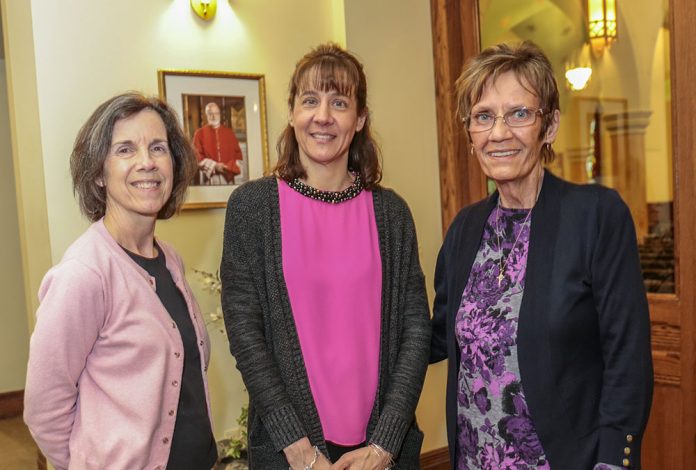
by Kate Ristow, Dan Thomas, Chris Weber, and Sister Janet Schaeffler
Q: Our parishes are merging and, as DREs, the two of us are determined to combine our religious education programs to produce a program even better than they were as independent programs. Can you give us some pointers on how to do this? Lots of other parishes must be facing the same challenge.
—Both of us in a large town
Dan Thomas’s Answer
A: The merging of parishes is one of those times of challenge and opportunity that can lead to great things. I hope that the merging process is a good one that involves consultation, planning, and dialogue between the parishes and their leaders. That will make the work of combining the religious education programs much less difficult.
The first important thing to do is talk to each other about the process, sharing your own feelings and thoughts about the merger. Getting in touch with and sharing your own attitudes will help you deal with the attitudes of parents, catechists, and the children in the programs. It seems like you have begun this already.
Second, consult with the leaders of each parish—parish council members and members of the education commissions—to get their ideas and suggestions. It is important to get a sense of how they feel about the merger and your plans on how it will happen.
Third, find out what parents and young people are thinking and feeling. Ask for their advice in a consultative process that listens as well as recognizes that the pastor and parish staff have the final say. This is essential in helping all take ownership of the program. Even after a final decision is made, continue listening to make adjustments as needed.
This is a great time to look at all the alternatives out there and to be truly creative in meeting the needs of the parish for faith formation that incorporates all parishioners.
According to Our Hearts Were Burning Within Us, adult faith formation is a central priority of the parish. Ask yourselves how you can make this happen. In your merging process, it is important to look at whole community catechesis in its various forms. A key question to ask yourselves is: How are we going to involve parents in the catechesis of their children? Your diocesan office of religious education can be a great resource for this.
You have a great opportunity to do some exciting things. You both seem determined to do something better. This is a great attitude. The key to make this work is your commitment to it and your intention to involve/consult/listen to those who will experience the impact of the change. Keep that positive attitude and be creative.
Dan Thomas served in catechetical leadership for over 30 years and remains involved in the national Conference for Catechetical Leadership (NCCL). He and his wife, Eileen, are the parents of two adult sons.
Kate Ristow’s Answer
A: Congratulations! You are already doing the most important thing—working together for the good of all. You have no hidden agendas; no “over my dead body” attitudes. What a fine example you are setting for the catechists and families of your merging parishes! Here are some other strategies for a successful transition.
1. Meet together frequently to talk through the details of how your programs are currently organized. How do you “do” First Communion at St. X? How does that differ from the traditions at St. Y? What religion texts do you use in the two programs? When are religious education sessions held? How many classes are conducted each year? How are catechists trained, and how often do they meet for formation? Be very frank during these discussions, sharing with each other the areas that are likely to cause uproar if changes are made.
2. Exchange forms, catechist handbooks, and other paperwork related to your programs. If you are truly open to working together, I’m willing to bet that both of you will find great ideas you wish you’d thought of yourself! Wow—a volunteer form, a friendly postcard that is sent to kids who miss a class session, creative retreat experiences for each grade level! Celebrate the great work you each have done in creating and managing your individual programs.
3. Rank in order of importance the decisions that must be made immediately. Set a schedule for implementing changes. Make a list of things that can wait until the second semester or the second year. It’s all a matter of priorities.
For example, it’s more important that you get your catechists working together as soon as possible than it is to plan the end-of-the-year appreciation party.
4. Form two committees, one for parents and another for catechists. Many of the decisions that must be made will have a significant impact on these two groups. Make these people part of the process.
5. Plan on being the “Doublemint Twins” the first year. In other words, nothing will demonstrate your unity better that your joint presence at every event. Wear name tags at every gathering; it will help the folks from the “other” parish get to know you. Mingle at events and go out of your way to meet as many people as possible, especially those who are touched by your programs.
6. Communicate. Communicate. Communicate! Use newsletters, the bulletin, mailings, and e-mails to keep families, catechists, and other interested parties aware of decisions, changes, and upcoming events. Information is power. Share that power with the people you serve.
Kate Ristow, Contributing Editor to CATECHIST, is National Catechetical Consultant for RCL Benziger. She has been involved in children’s religious education for over 25 years as a Catholic-school teacher and parish catechist.
Q: When you’ve been deeply discouraged and wondered “What’s the point?” what helped you get going again?
—Ben, Duluth, MN
Sister Janet Schaeffler’s Answer
A: A couple of proverbs:
When you’re in a hole, stop digging.
When you get to your wit’s end, you’ll find that God lives there.
Anyone can slay a dragon, but try waking up every morning and loving the world all over again. That’s what makes a real hero.
I would venture to say that most people in ministry today have experienced discouragement and wondered “What’s this all about? Am I making a difference? Should I keep on?”
And so perhaps that’s the first step: Recognize that there could be/might be times like this. Be prepared for these times so they don’t come as surprises that can throw you into a tailspin.
What has helped me to get going again? God’s presence, God’s wisdom, God’s unconditional love—and knowing that God’s presence, wisdom, and unconditional love come through the people and experiences of my life.
In times of discouragement, I have found that talking only to myself doesn’t provide me with the best conversation partner because I can keep reinforcing how I feel and what I’m thinking. Rather, I need others to help me think things through, to ask questions, to suggest other ways of seeing things, to challenge me. A spiritual director, friends who listen and affirm and challenge me, and a ministerial support group are some constant supports in my life. At the difficult times, these people who know me well can walk with me through what’s-the-point times.
Also, there are just-me things I have done. One of my favorite ways of praying is journaling. I try to do this all the time. But at difficult times—especially when I wonder if what I do is worthwhile—I have found that writing helps. At the end of the day, I write three things for which I am grateful that day. In the beginning, this can be difficult; I seem to write the opposite quite easily. As the days go on, though, it becomes easier. Writing helps me realize the reasons why what I do is worthwhile.
Finally, be awake and aware. I have found that in these difficult times—just when you need it most—there will be signs of how much you are needed and of what a difference you are making. I think these signs come all the time, but in our busyness, we often miss them. Perhaps they don’t come in the way we expect. In these times, especially, they will come. Are they a coincidence that they are coming just when we need them? Coincidence is God’s away of remaining anonymous.
After many years in parish and diocesan catechetical ministry, Janet Schaeffler, OP, is currently involved in catechetical/adult faith formation consultation, writing, workshops, days of reflection/retreats, and teaching. Her website is janetschaeffler.com.
Chris Weber’s Answer
A: When I feel discouraged, here are some strategies that get me back in life’s saddle:
1. I ask God to send me someone I can help. This action might seem counter-intuitive, particularly if your discouragement is based on a perception of being undervalued for the good work you do. Just try it; it works! I turn my sadness, loneliness, anxiety, frustration, or anger over to God in prayer, and then ask God to open my eyes to the next person who needs my assistance.
I did this once when I was feeling anxious about a serious financial matter. Within an hour of my prayer, I ended up in a very strange situation: driving around my rural university campus with a taxi driver who was delivering an altar cloth to someone. In my 12 years working on the campus, I have never again seen a cab driver. After the successful completion of this spontaneous task, I laughed out loud, and said, “Thank you, God!” My anxiety eased.
This prayer and action refocuses my energy toward God and others. It draws me into a world that is bigger than my problems. There is no better way to change my spiritual channel.
2. I rediscover relationships. I am an avid e-mail user. When I get a bit too stuck in my own little world, I find that easing off on e-mail and ramping up the more personal communication methods of calling people or visiting face to face helps draw me out of isolation.
3. I stop to remember whose work I am doing and whose child I am. When I am the most discouraged, I am usually unhappy with my work, my plans, my disappointing results. When I recall that this is not my work but the work of the God who loves me, I breathe a sigh of relief.
4. I pray, “Thy will, not mine, be done.” When I thank God for being the true Lord of my life, light and peace take the place of worry and frustration. It is easier said than done, but it gets results!
Chris Weber has worked in the field of catechesis for over 20 years: as a catechist, a parish catechetical leader, and a diocesan staff member. He is currently Director of the Mount Summer Program at Mount St. Mary’s University in Emmitsburg, MD.
Copyright 2011, Bayard, Inc. All rights reserved. This article is protected by United States copyright and other intellectual property laws and may not be reproduced, rewritten, distributed, redisseminated, transmitted, displayed, published or broadcast, directly or indirectly, in any medium without the prior written permission of Bayard, Inc.




